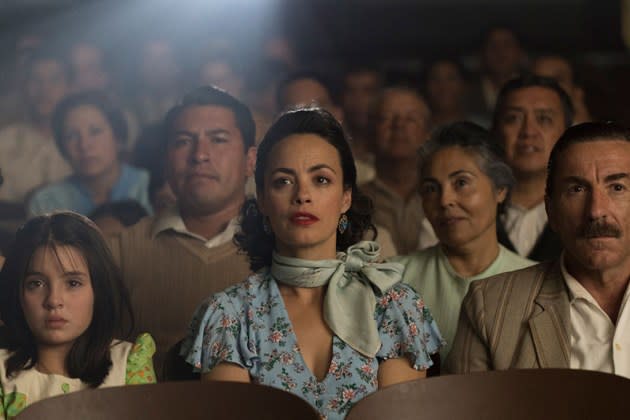‘The Movie Teller’ Review: Berenice Bejo and Daniel Bruhl in Lone Scherfig’s Graceful but Slight Drama About Film Love

Movies about movies tend to be as sentimental as Cinema Paradiso, the all-time tearjerker in the genre, or as caustic as the recent Babylon. But Lone Scherfig finds a fine balance between love of movies and the harsh wider world in The Movie Teller, a beautifully made coming-of-age film about Maria Margarita, who acts out the Hollywood movies she has seen at the local cinema in her small mining town. Set in the Chilean desert in the late 1960s and early ’70s, the drama benefits greatly from the sure hand and clear eye Scherfig has brought to her best films, other period pieces including An Education (2009) and Their Finest (2016). All that can’t quite make up for the rocky screenplay, though.
The story is adapted from the Chilean writer Hernan Rivera Letelier’s 2009 novel. The first version of the screenplay was tackled years ago by the Brazilian director Walter Salles, and more recently reworked by the Spanish writer-directors Isabel Coixet and Rafa Russo. The film has the cobbled-together feel of a literary adaptation that is too pared-down at the start and overstuffed toward the end.
More from The Hollywood Reporter
European Directors Back Agnieszka Holland Amid Polish Government Attacks
'Wicked Little Letters' Review: Olivia Colman and Jessie Buckley Reunite in Strained Period Comedy
We follow Maria Margarita as she grows from a girl, played by Alondra Valenzuela in a dynamic performance, to a young woman, played by Sara Becker, who makes her affecting. Becker’s opening voiceover, used sparingly, says, “I grew up in the driest place on Earth,” the Atacama Desert, site of a town for workers in the saltpeter mine. Bérénice Bejo (The Artist) plays her mother, Maria Magnolia, straining against the limits of her life as the mother of four and wife of a miner, Medardo (a solid Antonio de la Torre). In the smaller role of Hauser, the German manager of the mining company, Daniel Bruhl doesn’t have much more to do than give knowing, sympathetic looks, but he does that effectively. With its Danish director and international mix of writers and cast, the Spanish-language film is a virtual United Nations, but that part at least works seamlessly.
True to her lucid, no-frills style, Scherfig often keeps the camera on a face in the middle of the screen, holding just long enough for us to see what no one says: Maria Magnolia’s desperation, the haggard Medardo’s awareness of it. We observe what their young daughter might see without completely comprehending: the way Hauser brushes her mother’s hand.
The one bright spot in this family’s life is the cinema. On Sunday afternoon, they dress in their best and go to see Paths of Glory, The Man Who Shot Liberty Valence or Some Like It Hot. We see very brief glimpses of these movies along with the inevitable shots of the audience looking rapt, which Scherfig thankfully keeps to a minimum.
When Medardo loses the use of his legs in a mining accident, the family can’t afford more than one movie ticket, and in turn each of the children is sent to watch and tell the film to the others. In episodes that briefly add a comic tone, one brother can’t finish telling Breakfast at Tiffany’s because “Who can understand women?” When another tells about the lovers parting on a railway platform in The Umbrellas of Cherbourg it turns into a detailed description of the train.
But Maria Margarita is a natural, acting out films with dramatic flair. One day she is Jack Lemmon in The Apartment, the next she is Spartacus (well, who isn’t?). The specific movies are never the point. The soothing, magical escape they offer is. Bracingly, The Movie Teller recognizes that illusion can’t last.
The film was shot in the actual Atacama Desert, and Daniel Aranyo’s cinematography brings clear, cool light to the dusty landscape and beige palette. That look is punctuated by the bright pastels of Maria Magnolia’s wardrobe, a sign that she doesn’t belong in this drab life, and soon she runs off for good.
The story takes a leap in time and begins racing through events. Becker takes over the role, and the adult is now a vibrant, cheerful woman who works as a cleaner and also earns money telling movies to the town, and for individual clients. From then on the film shortchanges too many tragic turns, including a traumatic incident that Maria Margarita signals has happened by acting out Johnny Belinda.
The film is set during a turbulent period in Chile, and the slightest political undercurrent runs through most of it, including a brief scene of workers trying to organize against the capitalist mine owners. Those scenes don’t amount to much. But very near the end, it is 1970 and suddenly we hear news reports that the socialist Salvador Allende has been elected president, swiftly followed three years later by Augusto Pinochet’s military coup, events that result in violence and the closing of the mine. Despite a few scenes of Maria Margarita’s brother’s political activism, the news lands abruptly, like an intrusion of the real world on the hermetic town.
That isn’t necessarily a wrong-headed choice; the social changes might have hit the characters in just that blind-siding way. But like too many other dramatic plot turns here, it lands too jarringly to be convincing. Graceful but slight, in the end The Movie Teller tries to do too much and accomplishes too little to fulfill its big ambitions.
Best of The Hollywood Reporter

 Yahoo News
Yahoo News 